Ludwig van Beethoven: The Ultimate Biography and Resource

Beethoven, Ludwig van 1770-1827

Welcome to The Beethoven Experience!
At LVbeethoven.com we dive into the world of Ludwig van Beethoven – a musical genius who changed the course of classical music and left an indelible mark on the pages of history. From the grand symphonies that stir emotions to the intricate sonatas that touch the soul, Beethoven’s legacy is both profound and unparalleled.

Ludwig van Beethoven: A Glimpse into the Life of a Genius
Born in 1770 in the city of Bonn, Ludwig van Beethoven was destined to be one of the greatest composers the world has ever known. From an early age, his prodigious talent was evident, and he soon moved to Vienna, the epicenter of musical innovation. Overcoming a series of personal trials, including the tragedy of progressive deafness, Beethoven crafted compositions that are celebrated for their emotion, depth, and revolutionary spirit. His works, spanning from intimate piano sonatas to powerful symphonies, not only reflect his own struggles and joys but also resonate with universal human experiences.
Throughout his life, Beethoven remained a figure of fascination, admiration, and at times, controversy. Yet, his undying commitment to his art and his indomitable spirit have inspired countless generations of musicians, scholars, and music lovers around the globe.
Your Resource for Everything Beethoven
This website is dedicated entirely to Ludwig van Beethoven and the rich tapestry of his life and works. Delve deeper and explore:
The Definitive Ludwig van Beethoven Biography
Covering all of the most significant events and contributions of the the masterclass Composer that defined an era.
Music & Masterpieces
A comprehensive library of his celebrated compositions.
Books & Literature
Reviews and insights into the best books about Beethoven.
Family Tree
Trace the lineage and uncover the history of the Beethoven family.
Historical Timeline
Key events that shaped the life and times of the maestro.
Portrait Gallery
A visual journey through the many faces of Beethoven.
Philatelic Collection
Rare stamps and postal memorabilia commemorating Beethoven’s influence on culture.
… and so much more!
Join us as we celebrate the life, music, and legacy of Ludwig van Beethoven, a luminary who continues to inspire the world.
What’s new?
Make sure to check out our recently updated section on Beethoven Music. Includes comprehensive guides to all of Beethoven’s most beloved Symphonies, Sonatas, Piano Concerto’s, and more!
We are also in the process of updating and expanding our section on Beethoven Films. We provide comprehensive guides to all of the most acclaimed films that portrayed Beethoven’s extraordinary impact on the world.
Beethoven – Did you know?
One of the most beloved musical geniuses of all-time, Beethoven remains one of the most popular people (albeit deceased) in the world.
- Beethoven began losing his hearing in his late 20s, and by the age of 49, he was almost completely deaf, yet he continued to compose groundbreaking music.
- He was baptized on December 17, 1770, in Bonn, Germany, but his exact birthdate remains unknown.
- Beethoven’s “Moonlight Sonata” was dedicated to his pupil, Countess Giulietta Guicciardi, with whom he fell in love.
- Despite his fame, Beethoven often struggled financially and was supported by a group of wealthy patrons.
- His Symphony No. 9 was the first example of a major composer using voices in a symphony.
- Beethoven was known for his fiery personality and frequent mood swings, often reflected in his music.
- He never married, but his Immortal Beloved letters suggest he had a mysterious, intense love affair.
- Beethoven’s “Für Elise,” one of his most famous pieces, was discovered and published 40 years after his death.
- He was a crucial figure in the transition between the Classical and Romantic eras in Western music.
- Beethoven’s last words were reportedly “Pity, pity—too late!”, as he was told of a gift of wine from his publisher.
- His Ninth Symphony’s “Ode to Joy” is the anthem of the European Union.
- Beethoven often dipped his head in cold water before composing, believing it stimulated his creativity.
- He wrote only one opera, “Fidelio,” which was revised multiple times and premiered in its final form in 1814.
- As a child prodigy, Beethoven gave his first public performance at the age of 7½.
- His “Heiligenstadt Testament,” a letter written to his brothers, reveals his thoughts on his growing deafness and his resolve to continue living through his art.
- Beethoven’s compositions include 9 symphonies, 5 piano concertos, 1 violin concerto, 32 piano sonatas, and 16 string quartets.
- He was known to have a messy living space and a disheveled appearance, often focusing so intensely on his work that he neglected his surroundings.
- Beethoven was a great admirer of Napoleon until Napoleon declared himself Emperor, after which Beethoven famously scratched out Napoleon’s name from the dedication of his “Eroica” Symphony.
- His music was influenced by his love of nature, often taking long walks in the countryside for inspiration.
- Beethoven’s funeral in Vienna in 1827 was attended by an estimated 10,000 to 30,000 people, reflecting his immense popularity.
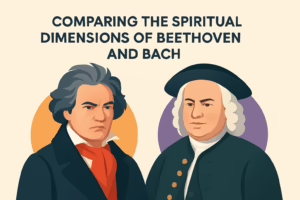
Comparing the Spiritual Dimensions of Beethoven and Bach
The world of classical music is a treasure trove of exceptional artistry, woven with the intricate layers of human emotion and spiritual exploration. Among this pantheon of musical titans, Ludwig van Beethoven and Johann Sebastian Bach stand out for their uniquely profound spiritual dimensions. Each composer offered a transcendent experience through their compositions, embodying their understanding and representation of spirituality,
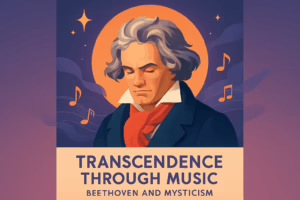
Transcendence Through Music: Beethoven and Mysticism
Introduction to the Intersection of Music and Mysticism Music holds an unparalleled ability to transcend the ordinary and connect us to deeper, more profound experiences. Among the numerous composers who have harnessed this power, Ludwig van Beethoven stands out as a luminary figure. His musical compositions provide listeners with an opportunity to tap into a mystical realm, elevating their human
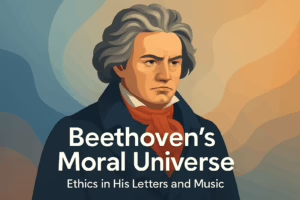
Beethoven’s Moral Universe: Ethics in His Letters and Music
Ludwig van Beethoven, a towering figure in the world of classical music, lived during a time of social upheaval and personal challenges. His compositions not only left a profound impact on the musical landscape, but also reflected a deep moral and ethical framework that governed his life and work. Beethoven’s letters and music reveal a complex interplay between artistic expression
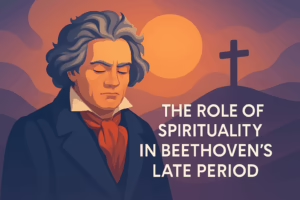
The Role of Spirituality in Beethoven’s Late Period
Ludwig van Beethoven, one of the greatest composers in Western music history, is a figure often admired for his profound musical genius. While much has been written about the technical and emotional depth of his compositions, less attention is paid to the spiritual dimensions of his works, particularly during his late period. This era of Beethoven’s composition, spanning roughly from
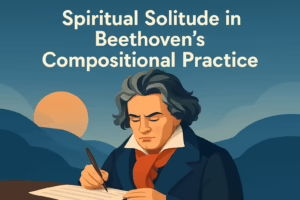
Spiritual Solitude in Beethoven’s Compositional Practice
Ludwig van Beethoven stands as one of the most towering figures in classical music. Known for his groundbreaking compositions, Beethoven imbued his music with a profound depth that still resonates today. His journey through music was not merely a professional endeavor; it was a deeply personal and spiritual experience. This article explores the concept of spiritual solitude in Beethoven’s compositional
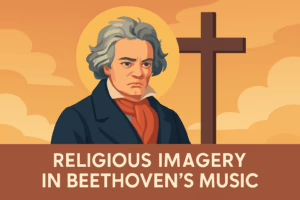
Religious Imagery in Beethoven’s Music
The music of Ludwig van Beethoven is renowned for its profound emotional depth, technical innovation, and universal appeal. Among the many elements that contribute to the power of Beethoven’s work is his use of religious imagery. This imagery is woven into some of his most influential compositions, shaping their themes and resonating deeply with audiences across the globe. Religious imagery
Frequently Asked Questions about Ludwig van Beethoven
Yes, Beethoven began to lose his hearing in his late twenties, and it deteriorated progressively over time. By his late 40s, he was almost completely deaf. Despite this significant challenge, many of Beethoven’s most celebrated works were composed during the period when he was experiencing profound hearing loss.
For more thorough information on Beethoven’s Deafness check out this comprehensive article we wrote on the topic – “Beethoven’s Deafness: Triumph of Creativity.”
There is no solid evidence to support the claim that Beethoven was black. The majority of historical records and portraits depict him as a European man of Caucasian descent. Over the years, there have been debates and speculations about his heritage, but there’s no concrete evidence to counter the widely accepted view of his ethnicity. Some of the debates arise from descriptions of Beethoven’s darker complexion, but this can be attributed to various reasons, including his health and the standards of description at the time.
Ludwig van Beethoven was born on December 17, 1770, in Bonn, a city in what is now Germany.
For more information check out our comprehensive Biography of Ludwig van Beethoven.
Beethoven passed away on March 26, 1827, in Vienna. The exact cause of his death is not definitively known. Over the years, various theories have been proposed, including lead poisoning, syphilis, and autoimmune disorders. During an autopsy, significant amounts of lead were found in Beethoven’s hair, lending support to the lead poisoning theory. However, the true cause of his death remains a subject of debate among historians and researchers.
Check out our comprehensive Biography of Ludwig van Beethoven for more information on this topic.
You may also want to check out Beethoven’s Family Tree.
Ludwig van Beethoven composed a total of 9 symphonies.
Visit (and listen) to Beethoven’s Symphonies and Music.
Also check out Beethoven’s Biography.
Use LVBeethoven.com as a resource to learn more about this extraordinary many.
Beethoven passed away on March 26, 1827.
For thorough information on the life of Ludwig van Beethoven check out Beethoven’s Biography.
Beethoven was born in Bonn, which is located in present-day Germany.
Here is a Chronology of Beethoven’s life – https://lvbeethoven.wpenginepowered.com/biography/chronology-of-beethovens-life/
Beethoven began to experience hearing loss in his late twenties. This hearing loss worsened progressively over the years, and by the time he was in his late 40s, he was almost completely deaf.
For the most comprehensive treatise on Beethoven’s Deafness check out “Beethoven’s Deafness: Triumph of Creativity.”
No, Beethoven was not blind. He is famously known for his hearing impairment, but there are no records or evidence to suggest that he suffered from blindness.
For a comprehensive look at the life of Ludwig van Beethoven check out his BIO.
Yes, Ludwig van Beethoven was German. He was born in Bonn, a city in the Electorate of Cologne, which was a part of the Holy Roman Empire at the time of his birth. This region is now in modern-day Germany.
Here are a few helpful links to learn more about Ludwig van Beethoven:
Music & Masterpieces
Books & Literature
Family Tree
Historical Timeline
Portrait Gallery
Philatelic Collection
LVBeethoven.com is your comprehensive resource for information about the impeccable Ludwig van Beethoven.
Perhaps the most famous piece by Ludwig van Beethoven is the Symphony No. 9 in D minor, Op. 125, often referred to as the “Choral” Symphony. This masterpiece is notable not just for its musical brilliance but also because it was the first time a major composer used voices in a symphony. The final movement of this symphony incorporates Friedrich Schiller’s “Ode to Joy,” sung by a chorus and soloists. This movement has since become an anthem for unity and fraternity. Moreover, the symphony’s structure, themes, and the sheer emotional power it exudes make it a groundbreaking work in the history of classical music. Today, the “Ode to Joy” theme is recognized worldwide and has been adapted for various purposes, including being the anthem of the European Union.
Check out our section dedicated to Beethoven’s Music.
Ludwig van Beethoven was a prolific composer, and throughout his lifetime, he composed a vast number of works across various musical genres. While it’s challenging to pinpoint an exact number due to variations in counting (some pieces have multiple parts, or movements), Beethoven wrote 9 symphonies, 32 piano sonatas, 16 string quartets, 5 piano concertos, 1 violin concerto, 1 opera (“Fidelio”), and many other compositions including sonatas for various instruments, overtures, choral works, and chamber music pieces. In total, he composed well over 200 individual works. His influence in shaping the Classical and Romantic eras of music is monumental, with many of his compositions being staples in the repertoires of orchestras, chamber groups, and soloists around the world.
Check out our section dedicated to Beethoven’s Music.
BTW – you can learn more about Beethoven through Films and Literature.
While Beethoven wrote numerous renowned pieces throughout his lifetime, the Symphony No. 9 in D minor, Op. 125, also known as the “Choral” Symphony, stands out as one of his most celebrated. The piece’s final movement is particularly famous for its incorporation of Friedrich Schiller’s “Ode to Joy,” performed by a choir and soloists. This inclusion of a choral element was revolutionary for symphonic works at the time. The symphony as a whole, and especially its final movement, is emblematic of Beethoven’s vision for music as a powerful force for unity and shared humanity. It encapsulates his masterful ability to convey profound emotions and ideals through musical expression. This symphony’s enduring popularity is a testament to its universal appeal and its representation of Beethoven’s genius.
Check out our section dedicated to Beethoven’s Music.
Don’t miss the Beethoven Biography for a thorough education on everything Beethoven.
Ludwig van Beethoven is buried in Vienna, Austria. Initially, he was interred at the Währing Cemetery, but in 1888, his remains, along with those of Franz Schubert, were moved to the Zentralfriedhof (Central Cemetery) in Vienna, one of the largest cemeteries in the world. The Zentralfriedhof is notable for its numerous graves of famous composers, making it a significant site for music enthusiasts and historians. Beethoven’s grave attracts countless visitors each year, who come to pay their respects to one of the greatest composers in the history of music. The grand monument marking his final resting place is a testament to the profound impact he left on the world of classical music and his enduring legacy.
Check out the chronology of Beethoven’s life.